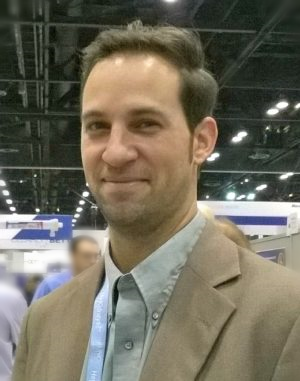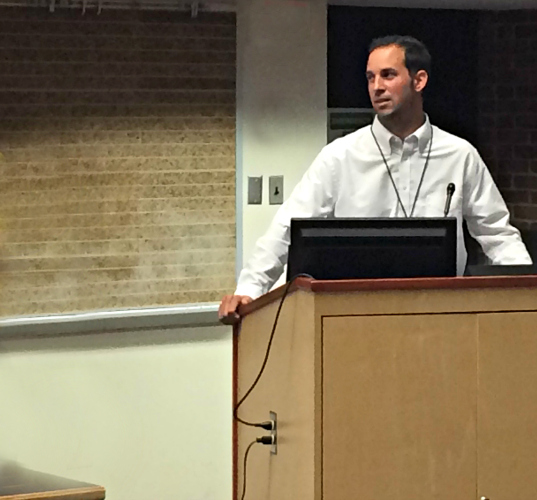
Dr. Steven Funk, instructor of medicine.
Steven Funk, PhD, has joined the Division of Nephrology faculty as an instructor of medicine.
A native of New Orleans, Dr. Funk earned his bachelor’s degree in microbiology from the University of Louisiana, Lafayette, and his doctoral degree in cell biology and anatomy from Louisiana State University Health Sciences Center, Shreveport. He came to Washington University in 2013 to begin his post-doctoral research in the laboratory of Dr. Jeffrey Miner in our division.
While working on his thesis in Dr. Wayne Orr’s laboratory at LSU, Funk first-authored multiple publications, including how basement membrane proteins inhibit inflammatory signaling in endothelial cells (Circ Res, 2010), showing that EphA2 is a novel proinflammatory mediator and potential regulator of atherosclerotic plaque development (Arterioscler Thromb Vasc Biol, 2012), detailing the mechanisms by which hyperglycemia affects endothelial cell biology to promote plaque formation (Int J Vasc Med, 2012), and how Eph/ephrin interactions affect inflammation and cardiovascular disease (Pharmacol Res, 2013; Circulation, 2017; Cell Signal, 2018).

Dr. Steven Funk presenting his research at the ASMB/Vanderbilt 2019 Workshop on Basement Membranes.
When he joined the Miner laboratory, Funk began studying diseases of the glomerular basement membrane (GMB), in particular Alport and Pierson syndromes. Alport syndrome is an inherited disease characterized by a progressive loss of kidney function, hearing loss and eye abnormalities, and is caused by genetic mutations affecting the type IV collagen family of proteins in basement membranes. Pierson syndrome is a rare congenital nephrotic syndrome with diffuse mesangial sclerosis as well as eye and neurologic abnormalities caused by mutations in the LAMB2 gene that encodes laminin b2, a component of the GBM laminin a5b2g1 heterotrimer.
Funk has helped develop a non-invasive, novel method that uses plucked hair follicles to diagnose X-linked Alport syndrome (Pediatr Nephrol, 2017). He led a study that helps explain the variability of the onset, symptoms, progression and severity often seen in patients with Alport Syndrome (J Am Soc Nephrol, 2018), and determined that an induced expression of Col4a3 in glomerular endothelial cells does not rescue Alport syndrome (Am J Physiol Renal Physiol, 2019). Most recently, he developed a new mouse model of chronic nephrotic syndrome by exacting a deletion in the N-terminal polymerizing domain of laminin β2 (Kidney Int, Accepted).